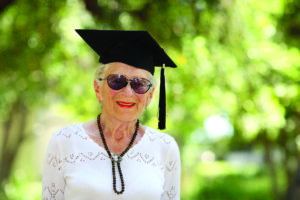 The average life span has increased more in the past century than in all the years humans previously existed. As approximately 10,000 baby boomers (those born between 1944 and 1964) are turning 65 every day, it would appear that we will have a large influx of aging people over the next couple decades who may need services appropriate for “old people.” But is 65 really old?
The average life span has increased more in the past century than in all the years humans previously existed. As approximately 10,000 baby boomers (those born between 1944 and 1964) are turning 65 every day, it would appear that we will have a large influx of aging people over the next couple decades who may need services appropriate for “old people.” But is 65 really old?
There are multiple factors that determine if one is considered old. In other words, the high number of years someone has been on this Earth does not necessarily define them as being old. Twenty years ago, a 65-year-old may have looked and acted different than the 65-year-old of today. In today’s world of medical technology, health products and smarter lifestyles, it may be hard to identify and categorize our ku¯ puna. With advances in healthcare and the pursuit of healthy lifestyles, it is possible that today’s 65-year-old looks and feels younger — more like a 45-year-old.
After gaining years of experience working and caring for the elderly, I can imagine many ways to describe what “aging” means. Aging looks different depending on your perspective.
Here is a rather dour perspective from the population in question regarding getting older based on a study conducted by Human Development Specialist Nina Chen: “Getting older means more years to add to your life, less active, less hair, more medicine, more wrinkles, arthritis and more forgetful. When people get older, they lose their dignity and independence. Being old means not being able to do anything.”
Positive outlooks documented in the study included: “Being old means more experiences and having privileges, for instance, senior discounts, senior centers, affordable housing for seniors and senior support groups. Getting older means getting wiser. Older people are just like a walking library. They have true stories — not fiction.”
Individual self-worth and dignity are important factors as we age. For older individuals, this means living life to the fullest each day and doing what you want to do. Lifestyle choices and changes can enhance the way we age. Below are some changes that may improve how we age:
• Stop smoking to allow more oxygen into your body’s cells.
• Stop drinking alcohol to keep your tissues in a healthy state.
• Exercise consistently to maintain mobility.
• Eat healthy foods to give your body the fuel it needs to regenerate cells.
• Drink more water so toxins absorbed from the environment will be flushed out.
• Stay out of the sun to avoid skin damage.
• Make and keep friends to stay engaged and thriving in society.
• And keep in mind that retirement leads to less stress. The age of retirement for full Social Security benefits is now 70.
Don’t have regrets about what you haven’t experienced. Get out there and seize the day!
ATTENTION PLUS CARE HOME HEALTHCARE
Accredited by The Joint Commission
1580 Makaloa St., Ste. 1060, Honolulu HI 96814
808-739-2811 | attentionplus.com
AGING IN HAWAII EDUCATIONAL OUTREACH PROGRAM
by Attention Plus Care — a program providing resources for seniors and their families, covering different aging topics each month. For class information and upcoming topics, call 808-440-9356.


Leave a Reply